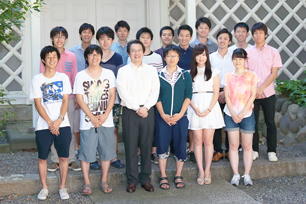Kazusei Kato, Professor, Faculty of Business and Commerce
Thinking about the Meaning of “Public” Centering on Transportation
The aim of my seminar class is to have students set their own research theme and to conduct analysis from both a theoretical and empirical perspective, after which they complete a graduation thesis that has policy implications.

My seminar class started this academic year. I specialize in transportation economics, but in the class we focus on “public” activities from a broader standpoint.
At the time of writing this article, my seminar class students are experiencing difficulties in deciding on their research themes. I would like them to proceed with their research with an awareness of issues while placing importance on what needs to be clarified.
At the same time, in order to convince a large number of people, analysis based on data is also necessary. When discussing policies, if data from our country is not available, I want students to use and analyze data from the U.S., and from there draw policy implications.
Themes that were proposed by students are wide-ranging, such as the level of hub activity at airports in the Tokyo metropolitan area and future airport policy, financial resources for infrastructure development in an era of declining birth rates and aging population—learning from a “deteriorating America,” the merits and demerits of electric power liberalization policies—what we can see from American state-level data, evaluation of taxi deregulation and future policy issues, aviation and bullet trains—competition between the two modes of transportation and the outlook for the future, aviation concerning remote islands from the standpoint of efficiency and fairness, revitalization of regional airports, the merits and demerits of World Heritage designation, and the effect on transportation in relation to urbanization.
During the Spring Semester, students learned about the basic tools and perspectives concerning theory and practice, and the main activities during the Fall Semester include reports and discussions of each student’s research. Members that handle similar themes will form a team to write a thesis for the Mita Festival, and after that, they will work on their individual thesis. Through this process, the themes may be slightly revised.
I also consider the seminar class as a place to develop students socially, so we invite lecturers from both within and outside the university to speak with us, and we are active with frequent on-site visits. This year, we will hold a lecture by an expert on logistics who has intimate theoretical and practical knowledge, and we have plans to visit airports and airline companies.
An atmosphere where students can refine their research through constructive discussions and are able to enjoy other moments—this is my ideal for a seminar class, and I would like to help create such an atmosphere.
Student's Voices
Shun Kawai
Third-year student, Faculty of Business and Commerce
The Appeal of a New Seminar Class
In our seminar class, each student decides on and researches a theme that interests them within the fields of transportation and America. Through lectures by guest speakers from outside the university and on-site visits, we develop our own viewpoints to actually get a sense of and think about social trends, so that what we learn at university doesn’t end up as a mere piece of knowledge. As members of the inaugural class, rather than being bound by predetermined rules and practices, we all think about what we should do, and together with the professor we are shaping the history of our seminar class activities. It is this spirited, lively atmosphere that is the biggest appeal of our seminar class.
*Position titles, etc., are those at the time of publishing.
